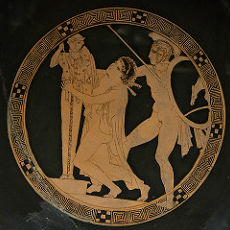The stories of the ancient Greeks, particularly those of Homer and the early playwrights, have attracted some of the best writers over the centuries. The most popular retelling of the moment is Madeline Miller's Circe. The title character is an awkward daughter of a titan who discovers her own talent for herbs and magic. Exiled after turning a romantic rival into a sea monster, she eventually meets Odysseus after turning his decidedly piggish crew into literal swine. Lyrical and character-driven, Miller's book does not shy away from the fantasy elements and has much to say about our own time.
While Circe and Odysseus take their time getting him back to Ithaca, Penelope has to contend with a castle full of unwanted suitors in Margaret Atwood's The Penelopiad. Told by the ghosts of 12 maids hung for disloyalty by Odysseus upon his return as well as by Penelope herself, the book brings Atwood's trademark wit and sharp observations to the story of the ultimate faithful wife.
In For the Most Beautiful, classics scholar Emily Hauser tells the story of two minor characters from The Iliad, Briseis and Krisayis. Briseis is the young queen of a small country that happens to get in the Greeks' way and Krisayis is the lovelorn daughter of a Trojan high priest. When their protectors are killed and the women are taken captive, it will take bravery, subtlety and smarts to escape the machinations of the Greek commanders and the gods.
Booker Award winner Pat Barker's The Silence of the Girls, which just came out, takes a markedly darker tone for the tale of Briseis. Treated as just another piece of loot, Briseis witnesses the horrors of war and the infighting among the Greeks. She finds some relief in the company of Patroclus, Achilles' companion, but this is a searing portrait of toxic masculinity and women's lives in wartime.
The famed Marion Zimmer Bradley writes of Cassandra in The Firebrand. Bringing a distinctly feminist bent to the story of the girl whose prophecies were never believed, Bradley tells her tale as part of a struggle between the male and female divine. Those who liked The Mists of Avalon by the same author will want to pick up this one.
House of Names by Colm Toibin retells the fall of the house of Atreus, mostly from the view of the women. Clytemnestra grows wily and vengeful after her husband Agamemnon sacrifices their daughter Iphigenia so he can go to war. Younger daughter Electra becomes devout and manipulative, getting her nebbishy brother Orestes to kill their mother as payback for their father's murder. Toibin's use of language is the primary draw for those unfamiliar with this bloody, passionate tale.
Have other tales of the ancient Greeks by acclaimed authors? Tell us in the comments.




Add a comment to: Homer’s Women: What to Read If You Liked Circe